人教版(2019)必修第一册Unit 1 Teenage Life Reading and Thinking 课件(共44张PPT)
文档属性
| 名称 | 人教版(2019)必修第一册Unit 1 Teenage Life Reading and Thinking 课件(共44张PPT) | 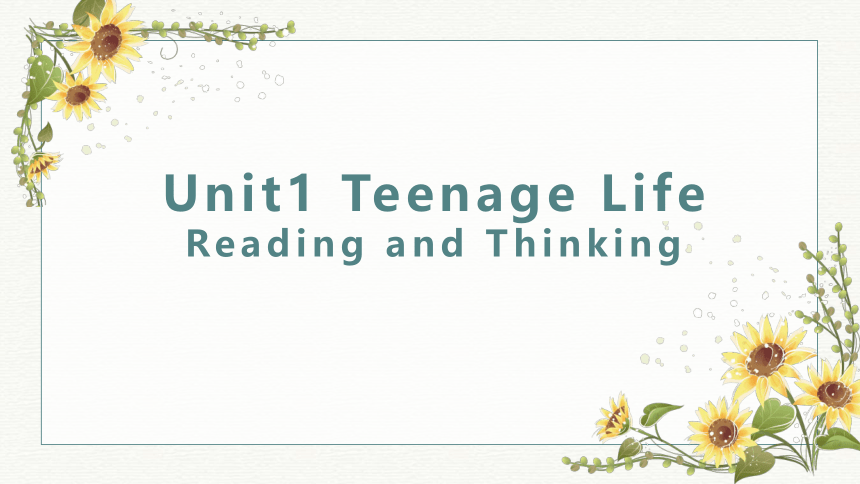 | |
| 格式 | pptx | ||
| 文件大小 | 4.1MB | ||
| 资源类型 | 教案 | ||
| 版本资源 | 人教版(2019) | ||
| 科目 | 英语 | ||
| 更新时间 | 2024-07-14 16:45:25 | ||
图片预览


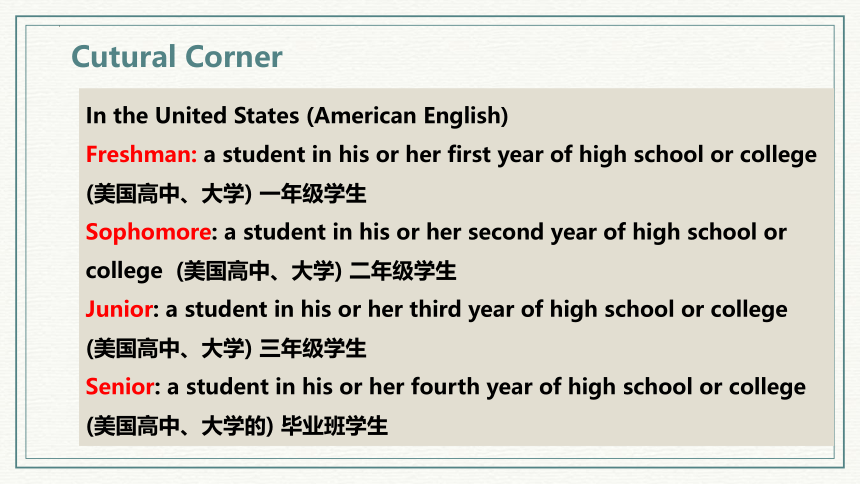
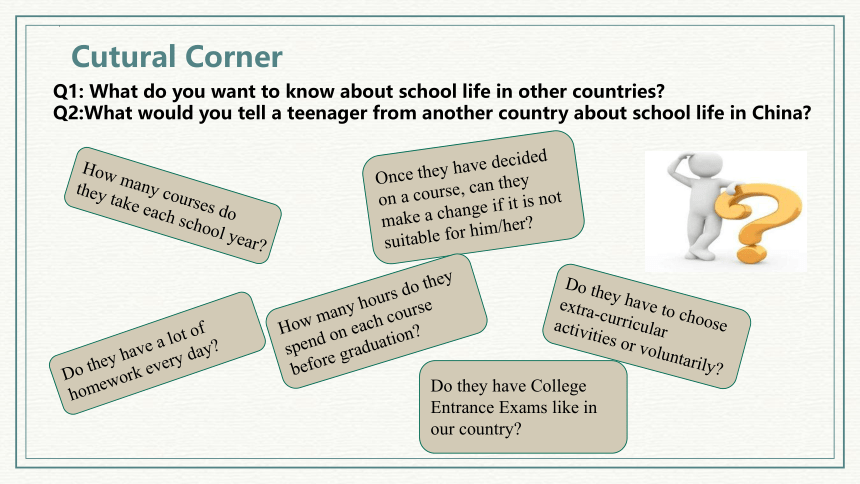
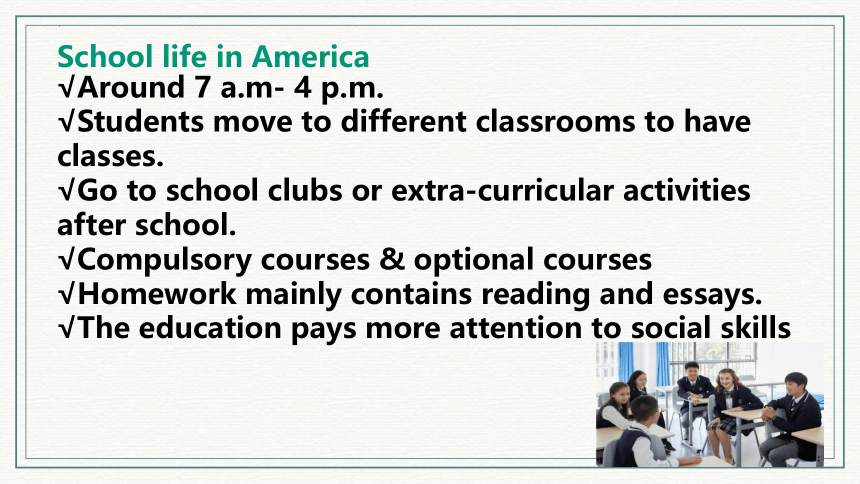
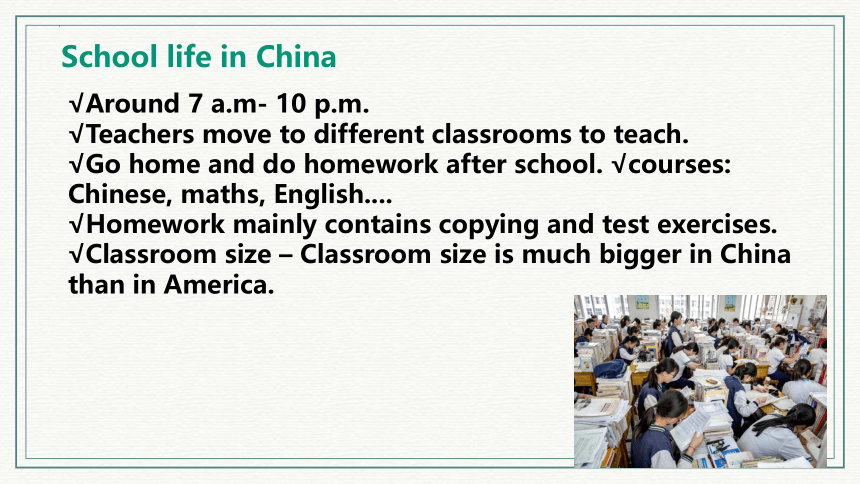
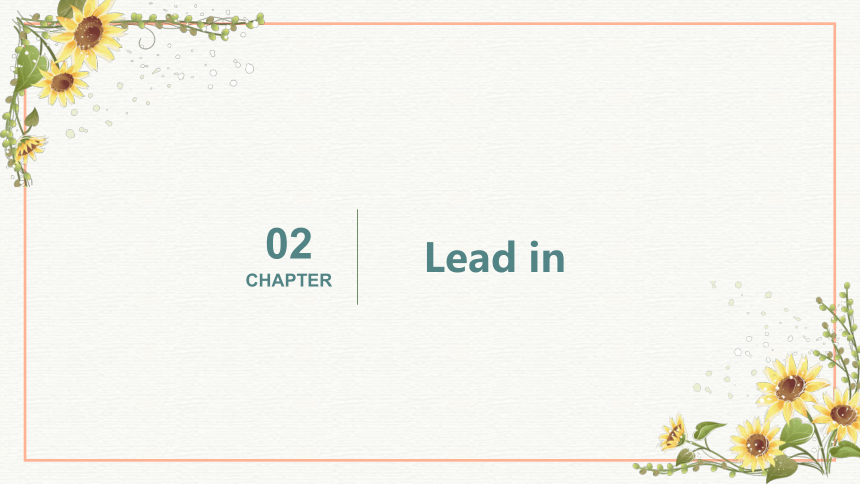

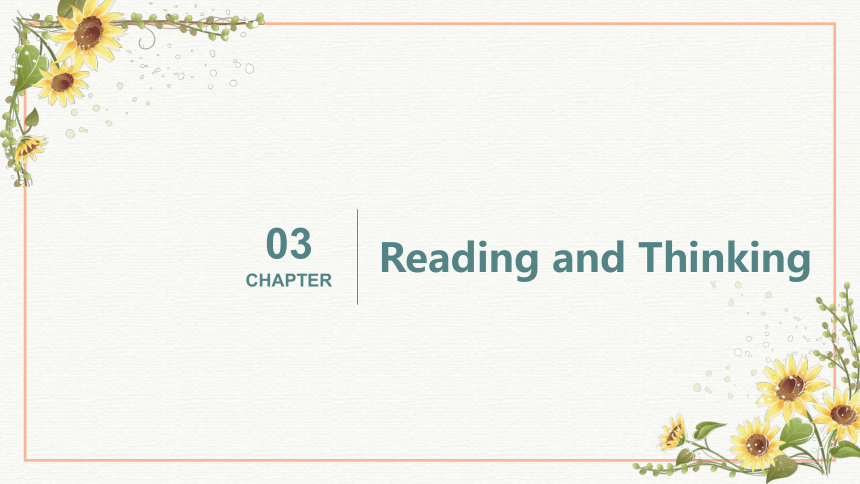
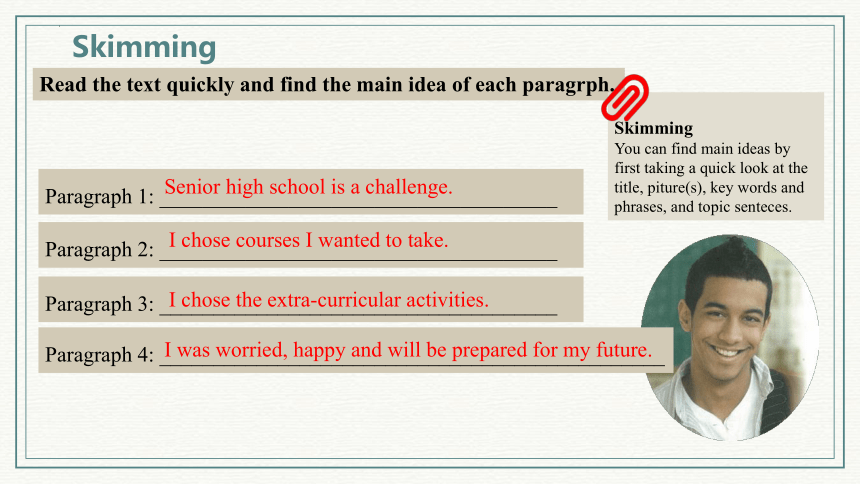
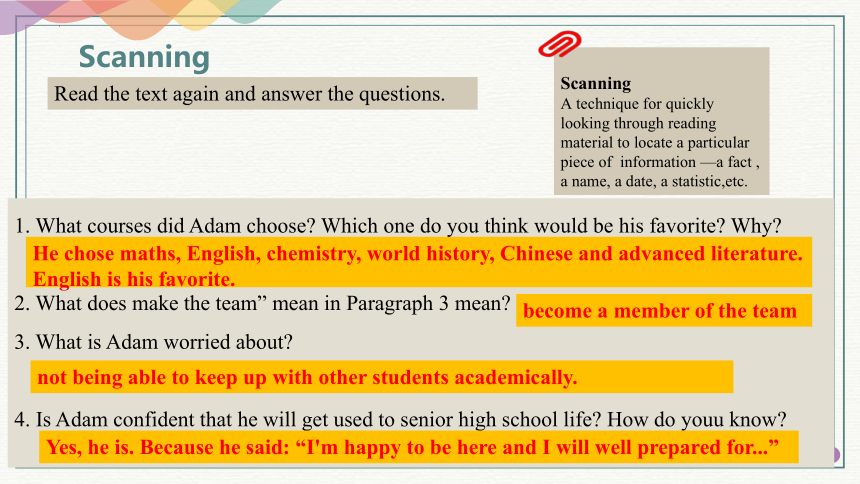
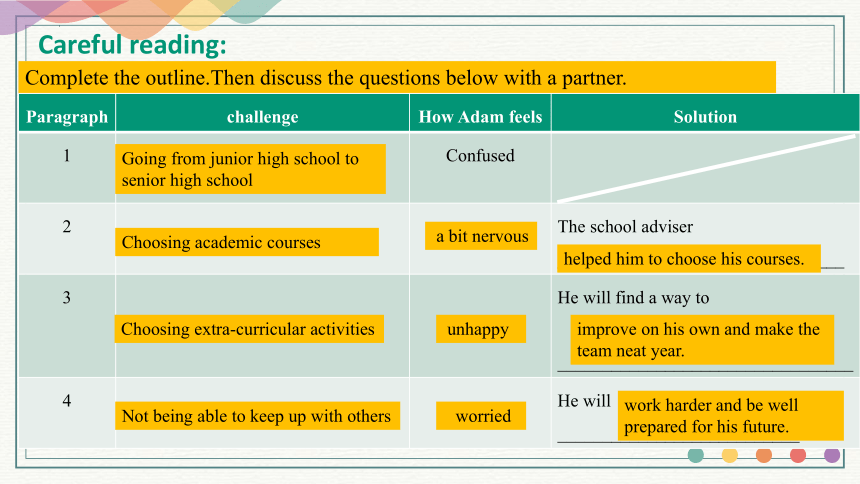
文档简介
(共44张PPT)
Unit1 Teenage Life
Reading and Thinking
01
CHAPTER
Cultural corner
Cutural Corner
In the United States (American English)
Freshman: a student in his or her first year of high school or college
(美国高中、大学) 一年级学生
Sophomore: a student in his or her second year of high school or college (美国高中、大学) 二年级学生
Junior: a student in his or her third year of high school or college
(美国高中、大学) 三年级学生
Senior: a student in his or her fourth year of high school or college
(美国高中、大学的) 毕业班学生
Cutural Corner
Q1: What do you want to know about school life in other countries
Q2:What would you tell a teenager from another country about school life in China
How many courses do they take each school year
Once they have decided on a course, can they make a change if it is not suitable for him/her
Do they have College Entrance Exams like in our country
Do they have a lot of homework every day
How many hours do they spend on each course before graduation
Do they have to choose extra-curricular activities or voluntarily
School life in America
√Around 7 a.m- 4 p.m.
√Students move to different classrooms to have classes.
√Go to school clubs or extra-curricular activities after school.
√Compulsory courses & optional courses
√Homework mainly contains reading and essays.
√The education pays more attention to social skills
School life in China
√Around 7 a.m- 10 p.m.
√Teachers move to different classrooms to teach.
√Go home and do homework after school. √courses: Chinese, maths, English....
√Homework mainly contains copying and test exercises.
√Classroom size – Classroom size is much bigger in China than in America.
02
CHAPTER
Lead in
Lead in
Free talk:
Q:How do you feel about your senior high school life What new difficulties have you met during your senior high school life
study
friendship
Accommodation(住宿)
schedule
I have difficulties in/ have trouble in
It is hard for me to
03
CHAPTER
Reading and Thinking
Skimming
Read the text quickly and find the main idea of each paragrph.
Paragraph 1: _____________________________________
Senior high school is a challenge.
Paragraph 2: _____________________________________
Paragraph 3: _____________________________________
Paragraph 4: _______________________________________________
I chose courses I wanted to take.
I chose the extra-curricular activities.
I was worried, happy and will be prepared for my future.
Skimming
You can find main ideas by
first taking a quick look at the
title, piture(s), key words and
phrases, and topic senteces.
Scanning
Read the text again and answer the questions.
Scanning
A technique for quickly looking through reading material to locate a particular piece of information —a fact , a name, a date, a statistic,etc.
1. What courses did Adam choose Which one do you think would be his favorite Why
2. What does make the team” mean in Paragraph 3 mean
3. What is Adam worried about
4. Is Adam confident that he will get used to senior high school life How do youu know
He chose maths, English, chemistry, world history, Chinese and advanced literature. English is his favorite.
become a member of the team
not being able to keep up with other students academically.
Yes, he is. Because he said: “I'm happy to be here and I will well prepared for...”
Complete the outline.Then discuss the questions below with a partner.
Paragraph challenge How Adam feels Solution
1 Confused
2 The school adviser
________________________________
3 He will find a way to
_________________________________
4 He will
___________________________
Going from junior high school to
senior high school
Choosing academic courses
Choosing extra-curricular activities
Not being able to keep up with others
helped him to choose his courses.
improve on his own and make the team neat year.
work harder and be well prepared for his future.
a bit nervous
unhappy
worried
Careful reading:
标题文本
Solution
Challenge 3
Solution
Challenge 4
Challenge 2
Solution
Challenge 1
Read&Analyze
Discuss the questions with your partner.
1. What kind of person do you think Adam is Why
2. Do you face the same challenges as Adam What other challenges are you facing How do you deal with them
3. What are some differences between Adam's school life and your school life
After reading
Adam appears to be hard-working and wants to get ahead in life. I know this because he thought carefully about which courses and extra-curricular activities to take, and thought hard about his future. He is also a kind person, because he joined a volunteer club.
Some of the challenges I face are very much like Adam's, while some are quite different. Unlike Adam, I don't have to choose my courses or my schedule. However, I am worried about my extra-curricular activities and trying to keep my hobbies. My solution to this challenge is to work harder at school so I can make more time for my extra-curricular activities and hobbies.
I don't have to choose my own courses. All day, I am in the same classroom with my classmates, and we all study the same courses.
Summary
Adam, a freshman at senior high school, found his first week was a little 1._______(confuse).First, he wondered which courses he wanted 2._______(take). Luckily, the school adviser 3._______(help) him a lot. One of the courses he chose is Chinese, because he hopes he can speak it 4._______(fluent) after graduation. He also signed up 5._______ advanced literature because he likes English and he is good at it. Besides, he wanted to join the school football team, 6._______the coach told him that he didn't play well enough. Although he felt unhappy, he didn't lose heart and decided to practice 7._______(play) football so that he could join it next year. Instead, Adam joined 8._______volunteer club to do his best to help the homeless in the community.
As a freshman, Adam met with some 9._______(difficulty), but he didn't quit. He tried 10._______(he) best to study harder to get well prepared for university or whatever else comes in the future.
confusing
to take
helped
fluently
for
but
playing
a
difficulties
his
04
CHAPTER
Langage points
1.volunteer n.志愿者
[例句1]He is the volunteer worker of our school.他是我们学校的志愿工作者。
[例句2]Helen volunteered to have Thanksgiving at her house this year.
海伦主动提出今年在她家过感恩节。
[知识拓展]
volunteer vt.& vi.自愿;志愿
volunteer to do sth.主动做某事
volunteer for sth.主动提出某事
voluntary adj.自愿的;志愿的
[趁热打铁]单句语法填空
①The couple often volunteer __________(take) part in activities helping those in trouble.
②One of the ______________(volunteer) for the rescue work injured himself when helping others.
答案:①to take ;②volunteers
2.debate n.辩论;争论 vt.& vi.辩论;争论
[例句1]Our class held a debate on whether students should take cell phones to school.
我们班进行了关于学生是否应该带手机去学校的辩论。
[例句2]If you would like to introduce your debate club to us, please reply to me!
如果你想向大家介绍你的辩论社,欢迎回复我!
[知识拓展]
under debate 正在讨论中
beyond debate 毋庸置疑
debate on/over/about sth. 就某事辩论
debate+从句 讨论……
辨析:debate, argue,quarrel,discuss
debate 多指公开、正式场合进行的辩论或严肃的争论,侧重双方各自申诉理由
argue 指一方坚持自己的意见、立场和观点,通过争论企图说服对方
quarrel 争吵,因生气而发生语言冲突
discuss 指为了解决问题或弄清对方的观点而进行的磋商,以便统一认识
[趁热打铁]单句语法填空
①We _________(debate) about what to do next now.
②The truth that the earth goes around the sun is __________ debate.
选词填空(debate/argue/quarrel/discuss)
③He __________ with Mary about the best place for a holiday.
④Those girls are always _______________ over little things.
⑤In today’s meeting we will further ___________ what to teach next week.
⑥The whole class ___________ heatedly on how to raise enough money.
答案:①are debating ②under ③argues ④quarrel ⑤discuss ⑥debates
3.prefer vt. 更喜欢;选择某事物(而不选择其他事物)
[例句1]I prefer to spend/spending the weekend at home.我喜欢在家里过周末。
[例句2]She preferred her husband not to drink.她宁愿丈夫不喝酒。
Would you prefer that we put off our wedding till next month
I prefer to work rather than (to) sit idle.
=Rather than sit idle I prefer to work.我宁愿工作而不愿闲坐。
[知识拓展]
(1)prefer to do sth. 更想做某事
prefer doing sth. 更想做某事
prefer A to B 比起B更喜欢A
prefer doing A to doing B 比起做B更喜欢做A
prefer to do A rather than do B 比起B更喜欢A
(2)preference n. 偏爱;喜好;优先权
have a preference for sth. 偏爱某物
[趁热打铁]单句语法填空
①I prefer staying at home watching TV to _________(go) shopping out.
②We preferred them ________(go) at once.
③I must say I have a strong _________(prefer)for French films.
答案:①going ②to go ③preference
4.content n.[U]满足;[pl.]所含之物,内容,目录;adj.满意的 vt.使满意
[例句1]I like the style of his writing but I don’t like the content.
我喜欢他的写作风格,但不喜欢他写的内容。
[例句2]The contents of the telegram are as follows.电报内容如下。
[知识拓展]
to one’s heart’s content 心满意足地;尽情地
be content with... 对……感到满意
be content to do sth. 乐意做某事
content oneself with sth.... 使自己满足于……
[趁热打铁]单句语法填空
①He wisely contented ___________(he) with his family and his love of nature.
②I would be well content __________(help) with the child’s wish.
答案:①himself ②to help
5.suitable adj.合适的;适用的
[例句1]Would now be a suitable moment to show the slides 现在放幻灯片合适吗?
[例句2]I want to buy some books that are suitable for children.
我想买一些适合儿童(阅读)的书。
[知识拓展]
be suitable to do sth. 适合做某事
be suitable for sb./sth. 适合某人/某物
It is suitable for sb.to do sth. 某人适合做某事
suit n.西装;一套外衣 vt.(服装、颜色等)适合;对(某人)方便;中……的意
[趁热打铁]单句语法填空
①I had great difficulty finding the ________(suit) food on the menu in that restaurant.
②Tom is a little careless, but he is otherwise quite suitable ________ the post.
答案:①suitable ②for
6.challenge n.挑战,艰巨任务 vt.怀疑;向……挑战
[教材例句P14]Going from junior high school is really a big challenge.从初中过渡到高中真是一项巨大的挑战。
[例句1]Senior high school is a challenge.高中是个挑战。
[例句2]They challenged him to produce evidence to support his opinions.
他们要他拿出证据证明自己的观点。
[例句3]In public, Michael challenged him at a dance contest.
迈克尔公开地在一个舞蹈比赛中挑战他。
知识拓展
the challenge of (doing) sth. (做)某事的挑战
face a challenge 面临挑战
accept/take up/take on a challenge 接受挑战
meet the challenge of... 迎接……的挑战
challenge sb.to sth. 向某人挑战某事;邀请某人比……赛
challenge sb.to do sth. 对某人做某事表示怀疑;激励某人做某事
challenging adj.具有挑战性的
[趁热打铁]单句语法填空
①Mike found a ___________(challenge) job as a computer programmer.
②Mike challenged me __________a game of chess.
答案:①challenging ②to
7.confuse vt.使糊涂;使迷惑
[教材例句P14]The first week was a little challenging.第一周的生活就让人有点困惑
[例句1]I understand the text but the diagrams are confusing me.
我理解文本,但那些图表把我弄糊涂了。
[例句2]The road signs confused the drivers.这些路标让司机们不知所措。
[例句3]These verbs cannot be confused.这些动词不能混淆。
[知识拓展]
confuse A and/with B 将A和B混淆
confuse sb.with (doing) sth. 通过(做)某事而使某人迷惑
confused adj.(人)困惑的;糊涂的
be/get confused with/about... 对……感到困惑
confusing adj.(事物)令人困惑的
confusion n.困惑;混乱
in confusion 困惑地;困窘地
[趁热打铁]单句语法填空
①We can conclude (推断) from his _______ look that he is __________ about this ________ problem.(confuse)
②His answers to my questions only added to my _________ (confuse); that’s why you found me ________ confusion that day.
答案:①confused;confused; confusing ②confusion ③in
8.fluent adj.(尤指外语)流利的;熟练的
[例句1]Ramon is fluent in English and French.拉蒙的英语和法语都讲得很流利。
[例句2]He was a fluent and quick writer.他是个文笔流畅、下笔成文的作家。
[知识拓展]
be fluent in... 在……方面流利
fluently adv.流利地;流畅地
fluency n.(尤指外语)流利,流畅
[趁热打铁]用fluent的适当形式完成下面语段
Speaking __________ English is our dream.Miss Chen, who speaks English ____________,says that ___________ develops gradually over considerable time and through lots of practice.
答案:①fluent ②fluently ③fluency
9.graduate vi&vt. 毕业; n. 毕业生
[教材例句P14]I know that Chinese is a very difficult language,but I hope to be fluent when I graduate.
[例句1]Mitch graduated from Stanford with a degree in law.
米奇从斯坦福大学毕业,获法学学位。
[例句2]My brother is a graduate of Yale.我哥哥是耶鲁大学的毕业生。
[知识拓展]
graduate at/from... 毕业于……(学校)
graduate in... 毕业于……(专业)
graduation n. [U]大学毕业
[趁热打铁]单句语法填空
①We have a class reunion.It’s ten years since I graduated ________ high school.
②My son hopes to graduate ______ law, so as to become a lawyer.
③College students hold a _________(graduate) ceremony to encourage themselves before they set off on their life journey.
答案:①from ②in ③graduation
10.recommend vt.建议;推荐;介绍
[教材例句P]My adviser recommended that I should sign up for advanced literature because I like English and I’m good at it.我的指导老师建议我选高级文学,因为我喜欢英语而且成绩不错。
[例句1]Perhaps you can recommend me a hotel.或许你能给我介绍一家旅馆。
[例句2]I’ll recommend him as her secretary.我要推荐他当她的秘书。
[例句3]I recommend buying this dictionary.我建议买这本词典。
[例句4]He recommended that we (should) read the novel.他建议我们读一读那部小说。
[知识拓展]
recommend sth.to sb. 向某人推荐某物
recommend sb.as... 推荐某人为……
recommend doing sth. 建议做某事
recommend sb. to do sth. 建议某人做某事
recommend that...建议……(从句的谓语用“should+动词原形”,should可省略)
recommendation n.推荐;建议;推荐信
[趁热打铁]单句语法填空
①I recommend you __________(think) very carefully before you make any decision.
②Of the two trips to the Yangtze River and Mount Tai, both are highly __________(recommend).
③We strongly recommend _________(report) the incident to the police.
答案:①should think ②recommended ③reporting
11.advance n.前进;发展 vi.前进;发展 vt.发展;促进
[例句1]The man advanced on us, shouting angrily.那个人愤怒地喊叫着向我们逼近。
[例句2]We live in an age of rapid technological advance.我们生活在技术迅猛发展的时代。
[例句3]Only those who had booked in advance were allowed in.只有那些预先订票的人可以进去。
[知识拓展]
advance on/towards sb./sth. 走近某人/物
in advance 预先;事先;预付
in advance of... 在……前头
make an advance/advances 取得进步
advanced adj.先进的;高级的;深奥的
[趁热打铁]单句语法填空
①__________(advance) technology was brought into the local factory last year.
②The crowd advanced ___________ the station.
③We have to pay the rent two weeks _________advance.
答案:①Advanced ②to/towards ③in
12.obviously adv.显然;明显地;显而易见地
[例句1]We’re obviously going to need more help.显然我们将需要更多的帮助。
[例句2]“Is she sorry?”“Obviously not!Look at her.”
“她难过吗?”“显然不!(你)看她那神态。”
[例句3]It was obvious that Gina was lying.吉娜显然是在撒谎。
[例句4]It might be obvious to you, but it isn’t to me.
这对你来说也许很容易理解,但对我却并非如此。
[知识拓展]
obvious adj.显然的,明显的;易理解的
It is obvious that... 很明显……(=obviously)
be obvious to... 对……很好理解
[趁热打铁]单句语法填空
①Diet and exercise are _________(obvious) important.
②_________ is obvious that cars should be used less to reduce pollution.
答案: ①obviously ②It
13.quit vi.& vt.(quit/quitted;quit/quitted)停止;戒掉;离开(岗位、学校等)
[教材句子P14]Obviously, I was unhappy,but I won’t quit.显然,我不开心,但我不会放弃
[例句1]He has quit smoking.他已戒烟了。
[例句2]He quit school at 15 and left home.他15岁辍学后离开了家。
[例句3]You must quit smoking.Most important of all, you should start taking exercise.你必须戒烟。最重要的是,你应该开始运动。
[知识拓展]
quit office 离职
quit school 辍学
quit doing sth. 停止做某事
[趁热打铁]单句语法填空
①A neighbour came to ask the band to quit ________(make) noises when they practised at 11∶00 p.m.
②Cathy ___________(quit) her job before her son was born so that she could stay home.
答案: ①making ②quit
14.solution n.解决方法;答案
[例句1]There are no simple solutions to the problem of overpopulation.
对人口过多的问题没有简单的解决方法。
[例句2]The solution to last week’s puzzle is on Page 12.上星期字谜的谜底在12页。
知识拓展
a solution to the problem 题的解决(方法)
solve v. 解决;解答
solve the problem 解决问题
[趁热打铁]单句语法填空
①In the end,one suggestion seems to be the solution ________ the problem.
②As usual, he found a practical __________(solve) to the difficult problem.
答案: ①to ②solution
15.schedule n.工作计划;日程安排 vt.安排;预定
[教材例句]Finding time for both studies and extra-curricular activities is a big challenge,so I need to make a workable schedule.为学习和课外活动都匀出时间是一项大的挑战,因此我需要定制一个可行的时间表。
[例句1]The new bridge has been finished two years ahead of schedule.新桥提前两年落成。
[例句2]The interview is scheduled for 10∶00 a.m. tomorrow.面试安排在明天早上10点。
[例句3]He is scheduled to visit the US next year.他预定明年访问美国。
[知识拓展]
ahead of schedule 提前
on schedule 按时
according to schedule 按日程表(进行)
behind schedule 比预定时间晚
be scheduled for... 安排在……
be scheduled to do sth. (某人)预定做某事
[趁热打铁]单句语法填空
①Thanks to your help,we finished the task ahead _________ schedule.
②Can the competition (比赛) be held _________ schedule
③We __________(schedule) to attend the exam from June 7th.
答案:①of ②on ③are scheduled
16.prepare for...为……做准备
[例句1]It is never too early to prepare for the future.为将来做准备越早越好。
[例句]Do you need time to prepare for the trip 你需要一些时间为旅行做准备吗?
知识拓展
prepared adj.有准备的;准备好的
preparation n.准备
make preparations for... 为……做准备
in preparation for... 为……做准备
温馨提示:
(1)prepare sth.表示“准备……”,后接名词或代词作宾语。prepare用作及物动词。
当宾语是食物之类的东西时,可译为“制,做”。
Our English teacher was preparing the lessons when I came into the office.
我进办公室时,我们的英语老师在备课。
(2)prepare for sth.表示“为……做准备”。prepare用作不及物动词。
The students are busy preparing for the final exam.学生们正在准备期末考试。
[趁热打铁]单句语法填空
①Make sure you have enough time to prepare _______ the new day ahead.
②How are you getting on with your _________(prepare)
答案:①for ②preparations
17.sign up (for sth.)报名(参加课程)
[例句[I’m thinking of signing up for the philosophy course this term.
我正在考虑报名参加这个学期的哲学课。
知识拓展
sign n.迹象;痕迹;征兆;指示牌;标记 v.签名;签订;做手势
sign language手势语
a road/traffic sign道路/交通标识
[趁热打铁]
①I’m ready to sign up _______ the mid July group.
答案:①for
18.on one’s own独自地;独立地
[例句1]My grandmother lives all on her own.我祖母独自一个人生活。
[例句2]He finished a difficult task on his own shortly after he entered the company.
他进公司后不久就独立完成了一项艰巨的任务。
[例句3]She’d like a flat of her own.她想有一套自己的公寓。
[知识拓展]
of one’s own 意为“(某人)自己的”,一般用作定语。
on one’s own 意为“独自地;独立地”,一般用作状语。
[趁热打铁]单句语法填空
①He has a house ______ his own,and the house was built ______ his own last year,so he is the owner of the house.
答案:①of;on
19.hand out把……拿出来;分发
[例句]Could you hand these books out,please 请把这些书发给大家好吗?
[知识拓展]
hand back 交还;归还
hand down 把……传下去
hand in 上交;提交
hand over 移交,交出
at hand 在手边;即将到来
by hand 用手;靠人工
on the one hand...on the other hand一方面……另一方面
[例句1]It is difficult to get used to another country’s customs.
要习惯于另一个国家的风俗是很困难的。
[例句2]The knife is used to cut fruits.
这把刀是用来切水果的。
[例句3]These kids used to live in a small village.It took them almost a year to get used to living in a large city.这些孩子过去住在一个小村庄里。他们花了将近一年的时间才适应了大城市的生活。
[知识拓展]
(1)be used to do...意为“被用来做……”,是use sth.to do...的被动形式,其中to为不定式符号,其后接动词原形。
(2)used to do sth.意为“以前常做某事”(暗含“现在不这样做了”之意),表示过去的习惯或过去经常发生的动作或存在的状态,used to后接动词原形。
(3)be/get used to doing sth.习惯于做某事
[趁热打铁]单句语法填空
①—She looked a little shy when you praised her.
—So she did.She was not used to _________(praise).
②Tom used to drink coffee in the morning, but now he gets used to __________ (drink)tea because he thinks it’s healthier.
③Money earned from some of the activities will be used __________ (help) people in need.
答案:①being praised ②drinking ③to help
20. get used to 习惯于
21.be responsible for对……负责;作为原因,成为起因
[例句1]Mike is responsible for designing the entire project.迈克负责设计全部工程。
[例句2]Cigarette smoking is responsible for about 90% of deaths from lung cancer.
因患肺癌而死亡的人,大约90%是吸烟所致。
[知识拓展]
responsibility n.责任;负责
a strong sense of responsibility 很强的责任感
have/take responsibility for... 对……有责任;为……负责任
take on responsibility 承担责任
It is one’s responsibility to do... 做……是某人的责任
[趁热打铁]单句语法填空
①Who is responsible _______ the traffic accident
②Parents need to encourage a sense of _________(responsible)in their children.
答案: ①for ②responsibility
21.keep up with跟上;赶上
[例句1]I’m having trouble keeping up with the rest of the class.
跟上全班的学习我有困难。
[例句2]It’s hard to keep up with the changes in computer technology.
要跟上电脑科技的变化是很难的。
[知识拓展]
keep up 继续;坚持;保持
keep away from 远离;避开
keep back 隐瞒;扣除
keep down 控制;抑制
keep...out(of)... 阻止……进入……
[趁热打铁]语法填空
①Owing to his illness,Peter couldn’t keep up ________ the rest of the class and get badly behind.
答案: ①with
22.deal with处理;安排;对付;涉及
[例句1]She has a lot of letters to deal with.她有大批信件需要处理。
[例句2]Her poems often deal with the subject of death.
她的诗经常涉及死亡这个主题。
[知识拓展]
deal with, do with
deal with deal 是不及物动词,deal with 一般与how 连用
do with do是及物动词,do with 一般与what 连用
[趁热打铁]语法填空
①I don’t know _______ to deal with this difficult problem.
②I think he’s just going to deal ________ this problem another day.
答案:①how ②with
句式一:
My adviser recommended that I should sign up for advanced literature because I like English and I’m good at it.我的指导老师建议我选高级文学,因为我喜欢英语而且成绩不错。
[知识拓展]
because,since,as均可引导原因状语从句,其用法区别如下:
①because引导原因状语从句,表示理由充分,有必然因果关系,能回答以why引起的问句,语气最强。
I did it because he told me to.是他吩咐我做,我才做的。
易混辨析: because与because of的用法区别
because 为连词,引导原因状语从句或名词性从句。
because of 为介词词组,后跟名词(短语)、代词、动名词或what 引导的名词性从句。
[例句]I didn’t like him not because of his being impolite but because he refused to
take the responsibility.我不喜欢他,不是因为他不礼貌,而是因为他拒绝承担责任。
②since 表示“既然”,引导原因状语从句,一般表示对方已知的、无须加以说明的既成事实的理由,全句中心在主句,语气比 because 弱。
[例句]Since we’ve got a few minutes to wait for the train, let’s have a cup of coffee.既然等火车还需要几分钟,我们去喝杯咖啡吧。
③as 表示“由于”,引导原因状语从句,表示十分明显的原因,一般说明因果关系,重点强调主句,语气较弱。
[例句]As it was getting late,I decided to book into a hotel.因为天色已晚,我决定找家旅馆投宿。
特别注意:
for 为并列连词,构成并列句,表示推理或解释,或用作附加说明,语气最弱,一般不放在句首。
[例句]We listened eagerly, for he brought news of our families.我们急不可待:地听着,因为他带来了我们家人的消息。
句式二:
I’ll find a way to improve on my own so that I can make a team next year.我会独自找到提高球技的方法,争取明年成为球队的医院。
[知识拓展]
So that引导目的状语从句
①so that引导目的状语从句,意为“以便”,不位于句首,前面不加逗号。从句谓语常含有can/could/should/might/would 等情态动词。可与 in order that 互换,但 in order that引导的从句可位于句首。
[例句]Study hard so that/in order that you can pass the entrance examination.努力学习,以便你能通过入学考试。
②当主句的主语与目的状语从句的主语一致时,可将此目的状语从句转换为目的状语 in order(not)to do sth/so as (not) to do sth。in order to 可以放在句首,而 so as to 不可以放在句首。
[例句]He hurried through his work so that he could catch the train.
=He hurried through his work so as to/in order to catch the train.= In order to catch
the train he hurried through his work.为了赶上火车,他急匆匆地赶完了工作。
句式三:
I’m a bit worried about keeping up with the other students in advanced course, and it’ll be quite difficult to get used to all the homework.我有点担心自己在高级课上是否能跟上其他同学,而适应所有课程的作业也并非易事。
[知识拓展]
It is/was +adj.+(for sb) to do sth
该句型是It作形式主语的一个句型。如果不定式的逻辑主语是for 引出的,句中的形容词通常是表示重要性、紧迫性、频繁程度、难易、安全等情况的形容词。常见的此类形容词有 important,necessary,common, normal, natural,hard, difficult,
easy, safe,dangerous, impossible,pleasant 等。
[例句]It is impossible for us to finish the work on time.
我们不可能按时完成这项工作。
[例句]It is important for her to come to the party.
来参加这个聚会对她来说很重要。
如果不定式的逻辑主语是of引出的,常用的形容词多为形容逻辑主语品质、特性的词,如 clever,wise,bright,silly,foolish,stupid,kind cruel,right,wrong 等。
[例句]It is kind of you to help me.你能帮助我真是太好了。
Thank you
Unit1 Teenage Life
Reading and Thinking
01
CHAPTER
Cultural corner
Cutural Corner
In the United States (American English)
Freshman: a student in his or her first year of high school or college
(美国高中、大学) 一年级学生
Sophomore: a student in his or her second year of high school or college (美国高中、大学) 二年级学生
Junior: a student in his or her third year of high school or college
(美国高中、大学) 三年级学生
Senior: a student in his or her fourth year of high school or college
(美国高中、大学的) 毕业班学生
Cutural Corner
Q1: What do you want to know about school life in other countries
Q2:What would you tell a teenager from another country about school life in China
How many courses do they take each school year
Once they have decided on a course, can they make a change if it is not suitable for him/her
Do they have College Entrance Exams like in our country
Do they have a lot of homework every day
How many hours do they spend on each course before graduation
Do they have to choose extra-curricular activities or voluntarily
School life in America
√Around 7 a.m- 4 p.m.
√Students move to different classrooms to have classes.
√Go to school clubs or extra-curricular activities after school.
√Compulsory courses & optional courses
√Homework mainly contains reading and essays.
√The education pays more attention to social skills
School life in China
√Around 7 a.m- 10 p.m.
√Teachers move to different classrooms to teach.
√Go home and do homework after school. √courses: Chinese, maths, English....
√Homework mainly contains copying and test exercises.
√Classroom size – Classroom size is much bigger in China than in America.
02
CHAPTER
Lead in
Lead in
Free talk:
Q:How do you feel about your senior high school life What new difficulties have you met during your senior high school life
study
friendship
Accommodation(住宿)
schedule
I have difficulties in/ have trouble in
It is hard for me to
03
CHAPTER
Reading and Thinking
Skimming
Read the text quickly and find the main idea of each paragrph.
Paragraph 1: _____________________________________
Senior high school is a challenge.
Paragraph 2: _____________________________________
Paragraph 3: _____________________________________
Paragraph 4: _______________________________________________
I chose courses I wanted to take.
I chose the extra-curricular activities.
I was worried, happy and will be prepared for my future.
Skimming
You can find main ideas by
first taking a quick look at the
title, piture(s), key words and
phrases, and topic senteces.
Scanning
Read the text again and answer the questions.
Scanning
A technique for quickly looking through reading material to locate a particular piece of information —a fact , a name, a date, a statistic,etc.
1. What courses did Adam choose Which one do you think would be his favorite Why
2. What does make the team” mean in Paragraph 3 mean
3. What is Adam worried about
4. Is Adam confident that he will get used to senior high school life How do youu know
He chose maths, English, chemistry, world history, Chinese and advanced literature. English is his favorite.
become a member of the team
not being able to keep up with other students academically.
Yes, he is. Because he said: “I'm happy to be here and I will well prepared for...”
Complete the outline.Then discuss the questions below with a partner.
Paragraph challenge How Adam feels Solution
1 Confused
2 The school adviser
________________________________
3 He will find a way to
_________________________________
4 He will
___________________________
Going from junior high school to
senior high school
Choosing academic courses
Choosing extra-curricular activities
Not being able to keep up with others
helped him to choose his courses.
improve on his own and make the team neat year.
work harder and be well prepared for his future.
a bit nervous
unhappy
worried
Careful reading:
标题文本
Solution
Challenge 3
Solution
Challenge 4
Challenge 2
Solution
Challenge 1
Read&Analyze
Discuss the questions with your partner.
1. What kind of person do you think Adam is Why
2. Do you face the same challenges as Adam What other challenges are you facing How do you deal with them
3. What are some differences between Adam's school life and your school life
After reading
Adam appears to be hard-working and wants to get ahead in life. I know this because he thought carefully about which courses and extra-curricular activities to take, and thought hard about his future. He is also a kind person, because he joined a volunteer club.
Some of the challenges I face are very much like Adam's, while some are quite different. Unlike Adam, I don't have to choose my courses or my schedule. However, I am worried about my extra-curricular activities and trying to keep my hobbies. My solution to this challenge is to work harder at school so I can make more time for my extra-curricular activities and hobbies.
I don't have to choose my own courses. All day, I am in the same classroom with my classmates, and we all study the same courses.
Summary
Adam, a freshman at senior high school, found his first week was a little 1._______(confuse).First, he wondered which courses he wanted 2._______(take). Luckily, the school adviser 3._______(help) him a lot. One of the courses he chose is Chinese, because he hopes he can speak it 4._______(fluent) after graduation. He also signed up 5._______ advanced literature because he likes English and he is good at it. Besides, he wanted to join the school football team, 6._______the coach told him that he didn't play well enough. Although he felt unhappy, he didn't lose heart and decided to practice 7._______(play) football so that he could join it next year. Instead, Adam joined 8._______volunteer club to do his best to help the homeless in the community.
As a freshman, Adam met with some 9._______(difficulty), but he didn't quit. He tried 10._______(he) best to study harder to get well prepared for university or whatever else comes in the future.
confusing
to take
helped
fluently
for
but
playing
a
difficulties
his
04
CHAPTER
Langage points
1.volunteer n.志愿者
[例句1]He is the volunteer worker of our school.他是我们学校的志愿工作者。
[例句2]Helen volunteered to have Thanksgiving at her house this year.
海伦主动提出今年在她家过感恩节。
[知识拓展]
volunteer vt.& vi.自愿;志愿
volunteer to do sth.主动做某事
volunteer for sth.主动提出某事
voluntary adj.自愿的;志愿的
[趁热打铁]单句语法填空
①The couple often volunteer __________(take) part in activities helping those in trouble.
②One of the ______________(volunteer) for the rescue work injured himself when helping others.
答案:①to take ;②volunteers
2.debate n.辩论;争论 vt.& vi.辩论;争论
[例句1]Our class held a debate on whether students should take cell phones to school.
我们班进行了关于学生是否应该带手机去学校的辩论。
[例句2]If you would like to introduce your debate club to us, please reply to me!
如果你想向大家介绍你的辩论社,欢迎回复我!
[知识拓展]
under debate 正在讨论中
beyond debate 毋庸置疑
debate on/over/about sth. 就某事辩论
debate+从句 讨论……
辨析:debate, argue,quarrel,discuss
debate 多指公开、正式场合进行的辩论或严肃的争论,侧重双方各自申诉理由
argue 指一方坚持自己的意见、立场和观点,通过争论企图说服对方
quarrel 争吵,因生气而发生语言冲突
discuss 指为了解决问题或弄清对方的观点而进行的磋商,以便统一认识
[趁热打铁]单句语法填空
①We _________(debate) about what to do next now.
②The truth that the earth goes around the sun is __________ debate.
选词填空(debate/argue/quarrel/discuss)
③He __________ with Mary about the best place for a holiday.
④Those girls are always _______________ over little things.
⑤In today’s meeting we will further ___________ what to teach next week.
⑥The whole class ___________ heatedly on how to raise enough money.
答案:①are debating ②under ③argues ④quarrel ⑤discuss ⑥debates
3.prefer vt. 更喜欢;选择某事物(而不选择其他事物)
[例句1]I prefer to spend/spending the weekend at home.我喜欢在家里过周末。
[例句2]She preferred her husband not to drink.她宁愿丈夫不喝酒。
Would you prefer that we put off our wedding till next month
I prefer to work rather than (to) sit idle.
=Rather than sit idle I prefer to work.我宁愿工作而不愿闲坐。
[知识拓展]
(1)prefer to do sth. 更想做某事
prefer doing sth. 更想做某事
prefer A to B 比起B更喜欢A
prefer doing A to doing B 比起做B更喜欢做A
prefer to do A rather than do B 比起B更喜欢A
(2)preference n. 偏爱;喜好;优先权
have a preference for sth. 偏爱某物
[趁热打铁]单句语法填空
①I prefer staying at home watching TV to _________(go) shopping out.
②We preferred them ________(go) at once.
③I must say I have a strong _________(prefer)for French films.
答案:①going ②to go ③preference
4.content n.[U]满足;[pl.]所含之物,内容,目录;adj.满意的 vt.使满意
[例句1]I like the style of his writing but I don’t like the content.
我喜欢他的写作风格,但不喜欢他写的内容。
[例句2]The contents of the telegram are as follows.电报内容如下。
[知识拓展]
to one’s heart’s content 心满意足地;尽情地
be content with... 对……感到满意
be content to do sth. 乐意做某事
content oneself with sth.... 使自己满足于……
[趁热打铁]单句语法填空
①He wisely contented ___________(he) with his family and his love of nature.
②I would be well content __________(help) with the child’s wish.
答案:①himself ②to help
5.suitable adj.合适的;适用的
[例句1]Would now be a suitable moment to show the slides 现在放幻灯片合适吗?
[例句2]I want to buy some books that are suitable for children.
我想买一些适合儿童(阅读)的书。
[知识拓展]
be suitable to do sth. 适合做某事
be suitable for sb./sth. 适合某人/某物
It is suitable for sb.to do sth. 某人适合做某事
suit n.西装;一套外衣 vt.(服装、颜色等)适合;对(某人)方便;中……的意
[趁热打铁]单句语法填空
①I had great difficulty finding the ________(suit) food on the menu in that restaurant.
②Tom is a little careless, but he is otherwise quite suitable ________ the post.
答案:①suitable ②for
6.challenge n.挑战,艰巨任务 vt.怀疑;向……挑战
[教材例句P14]Going from junior high school is really a big challenge.从初中过渡到高中真是一项巨大的挑战。
[例句1]Senior high school is a challenge.高中是个挑战。
[例句2]They challenged him to produce evidence to support his opinions.
他们要他拿出证据证明自己的观点。
[例句3]In public, Michael challenged him at a dance contest.
迈克尔公开地在一个舞蹈比赛中挑战他。
知识拓展
the challenge of (doing) sth. (做)某事的挑战
face a challenge 面临挑战
accept/take up/take on a challenge 接受挑战
meet the challenge of... 迎接……的挑战
challenge sb.to sth. 向某人挑战某事;邀请某人比……赛
challenge sb.to do sth. 对某人做某事表示怀疑;激励某人做某事
challenging adj.具有挑战性的
[趁热打铁]单句语法填空
①Mike found a ___________(challenge) job as a computer programmer.
②Mike challenged me __________a game of chess.
答案:①challenging ②to
7.confuse vt.使糊涂;使迷惑
[教材例句P14]The first week was a little challenging.第一周的生活就让人有点困惑
[例句1]I understand the text but the diagrams are confusing me.
我理解文本,但那些图表把我弄糊涂了。
[例句2]The road signs confused the drivers.这些路标让司机们不知所措。
[例句3]These verbs cannot be confused.这些动词不能混淆。
[知识拓展]
confuse A and/with B 将A和B混淆
confuse sb.with (doing) sth. 通过(做)某事而使某人迷惑
confused adj.(人)困惑的;糊涂的
be/get confused with/about... 对……感到困惑
confusing adj.(事物)令人困惑的
confusion n.困惑;混乱
in confusion 困惑地;困窘地
[趁热打铁]单句语法填空
①We can conclude (推断) from his _______ look that he is __________ about this ________ problem.(confuse)
②His answers to my questions only added to my _________ (confuse); that’s why you found me ________ confusion that day.
答案:①confused;confused; confusing ②confusion ③in
8.fluent adj.(尤指外语)流利的;熟练的
[例句1]Ramon is fluent in English and French.拉蒙的英语和法语都讲得很流利。
[例句2]He was a fluent and quick writer.他是个文笔流畅、下笔成文的作家。
[知识拓展]
be fluent in... 在……方面流利
fluently adv.流利地;流畅地
fluency n.(尤指外语)流利,流畅
[趁热打铁]用fluent的适当形式完成下面语段
Speaking __________ English is our dream.Miss Chen, who speaks English ____________,says that ___________ develops gradually over considerable time and through lots of practice.
答案:①fluent ②fluently ③fluency
9.graduate vi&vt. 毕业; n. 毕业生
[教材例句P14]I know that Chinese is a very difficult language,but I hope to be fluent when I graduate.
[例句1]Mitch graduated from Stanford with a degree in law.
米奇从斯坦福大学毕业,获法学学位。
[例句2]My brother is a graduate of Yale.我哥哥是耶鲁大学的毕业生。
[知识拓展]
graduate at/from... 毕业于……(学校)
graduate in... 毕业于……(专业)
graduation n. [U]大学毕业
[趁热打铁]单句语法填空
①We have a class reunion.It’s ten years since I graduated ________ high school.
②My son hopes to graduate ______ law, so as to become a lawyer.
③College students hold a _________(graduate) ceremony to encourage themselves before they set off on their life journey.
答案:①from ②in ③graduation
10.recommend vt.建议;推荐;介绍
[教材例句P]My adviser recommended that I should sign up for advanced literature because I like English and I’m good at it.我的指导老师建议我选高级文学,因为我喜欢英语而且成绩不错。
[例句1]Perhaps you can recommend me a hotel.或许你能给我介绍一家旅馆。
[例句2]I’ll recommend him as her secretary.我要推荐他当她的秘书。
[例句3]I recommend buying this dictionary.我建议买这本词典。
[例句4]He recommended that we (should) read the novel.他建议我们读一读那部小说。
[知识拓展]
recommend sth.to sb. 向某人推荐某物
recommend sb.as... 推荐某人为……
recommend doing sth. 建议做某事
recommend sb. to do sth. 建议某人做某事
recommend that...建议……(从句的谓语用“should+动词原形”,should可省略)
recommendation n.推荐;建议;推荐信
[趁热打铁]单句语法填空
①I recommend you __________(think) very carefully before you make any decision.
②Of the two trips to the Yangtze River and Mount Tai, both are highly __________(recommend).
③We strongly recommend _________(report) the incident to the police.
答案:①should think ②recommended ③reporting
11.advance n.前进;发展 vi.前进;发展 vt.发展;促进
[例句1]The man advanced on us, shouting angrily.那个人愤怒地喊叫着向我们逼近。
[例句2]We live in an age of rapid technological advance.我们生活在技术迅猛发展的时代。
[例句3]Only those who had booked in advance were allowed in.只有那些预先订票的人可以进去。
[知识拓展]
advance on/towards sb./sth. 走近某人/物
in advance 预先;事先;预付
in advance of... 在……前头
make an advance/advances 取得进步
advanced adj.先进的;高级的;深奥的
[趁热打铁]单句语法填空
①__________(advance) technology was brought into the local factory last year.
②The crowd advanced ___________ the station.
③We have to pay the rent two weeks _________advance.
答案:①Advanced ②to/towards ③in
12.obviously adv.显然;明显地;显而易见地
[例句1]We’re obviously going to need more help.显然我们将需要更多的帮助。
[例句2]“Is she sorry?”“Obviously not!Look at her.”
“她难过吗?”“显然不!(你)看她那神态。”
[例句3]It was obvious that Gina was lying.吉娜显然是在撒谎。
[例句4]It might be obvious to you, but it isn’t to me.
这对你来说也许很容易理解,但对我却并非如此。
[知识拓展]
obvious adj.显然的,明显的;易理解的
It is obvious that... 很明显……(=obviously)
be obvious to... 对……很好理解
[趁热打铁]单句语法填空
①Diet and exercise are _________(obvious) important.
②_________ is obvious that cars should be used less to reduce pollution.
答案: ①obviously ②It
13.quit vi.& vt.(quit/quitted;quit/quitted)停止;戒掉;离开(岗位、学校等)
[教材句子P14]Obviously, I was unhappy,but I won’t quit.显然,我不开心,但我不会放弃
[例句1]He has quit smoking.他已戒烟了。
[例句2]He quit school at 15 and left home.他15岁辍学后离开了家。
[例句3]You must quit smoking.Most important of all, you should start taking exercise.你必须戒烟。最重要的是,你应该开始运动。
[知识拓展]
quit office 离职
quit school 辍学
quit doing sth. 停止做某事
[趁热打铁]单句语法填空
①A neighbour came to ask the band to quit ________(make) noises when they practised at 11∶00 p.m.
②Cathy ___________(quit) her job before her son was born so that she could stay home.
答案: ①making ②quit
14.solution n.解决方法;答案
[例句1]There are no simple solutions to the problem of overpopulation.
对人口过多的问题没有简单的解决方法。
[例句2]The solution to last week’s puzzle is on Page 12.上星期字谜的谜底在12页。
知识拓展
a solution to the problem 题的解决(方法)
solve v. 解决;解答
solve the problem 解决问题
[趁热打铁]单句语法填空
①In the end,one suggestion seems to be the solution ________ the problem.
②As usual, he found a practical __________(solve) to the difficult problem.
答案: ①to ②solution
15.schedule n.工作计划;日程安排 vt.安排;预定
[教材例句]Finding time for both studies and extra-curricular activities is a big challenge,so I need to make a workable schedule.为学习和课外活动都匀出时间是一项大的挑战,因此我需要定制一个可行的时间表。
[例句1]The new bridge has been finished two years ahead of schedule.新桥提前两年落成。
[例句2]The interview is scheduled for 10∶00 a.m. tomorrow.面试安排在明天早上10点。
[例句3]He is scheduled to visit the US next year.他预定明年访问美国。
[知识拓展]
ahead of schedule 提前
on schedule 按时
according to schedule 按日程表(进行)
behind schedule 比预定时间晚
be scheduled for... 安排在……
be scheduled to do sth. (某人)预定做某事
[趁热打铁]单句语法填空
①Thanks to your help,we finished the task ahead _________ schedule.
②Can the competition (比赛) be held _________ schedule
③We __________(schedule) to attend the exam from June 7th.
答案:①of ②on ③are scheduled
16.prepare for...为……做准备
[例句1]It is never too early to prepare for the future.为将来做准备越早越好。
[例句]Do you need time to prepare for the trip 你需要一些时间为旅行做准备吗?
知识拓展
prepared adj.有准备的;准备好的
preparation n.准备
make preparations for... 为……做准备
in preparation for... 为……做准备
温馨提示:
(1)prepare sth.表示“准备……”,后接名词或代词作宾语。prepare用作及物动词。
当宾语是食物之类的东西时,可译为“制,做”。
Our English teacher was preparing the lessons when I came into the office.
我进办公室时,我们的英语老师在备课。
(2)prepare for sth.表示“为……做准备”。prepare用作不及物动词。
The students are busy preparing for the final exam.学生们正在准备期末考试。
[趁热打铁]单句语法填空
①Make sure you have enough time to prepare _______ the new day ahead.
②How are you getting on with your _________(prepare)
答案:①for ②preparations
17.sign up (for sth.)报名(参加课程)
[例句[I’m thinking of signing up for the philosophy course this term.
我正在考虑报名参加这个学期的哲学课。
知识拓展
sign n.迹象;痕迹;征兆;指示牌;标记 v.签名;签订;做手势
sign language手势语
a road/traffic sign道路/交通标识
[趁热打铁]
①I’m ready to sign up _______ the mid July group.
答案:①for
18.on one’s own独自地;独立地
[例句1]My grandmother lives all on her own.我祖母独自一个人生活。
[例句2]He finished a difficult task on his own shortly after he entered the company.
他进公司后不久就独立完成了一项艰巨的任务。
[例句3]She’d like a flat of her own.她想有一套自己的公寓。
[知识拓展]
of one’s own 意为“(某人)自己的”,一般用作定语。
on one’s own 意为“独自地;独立地”,一般用作状语。
[趁热打铁]单句语法填空
①He has a house ______ his own,and the house was built ______ his own last year,so he is the owner of the house.
答案:①of;on
19.hand out把……拿出来;分发
[例句]Could you hand these books out,please 请把这些书发给大家好吗?
[知识拓展]
hand back 交还;归还
hand down 把……传下去
hand in 上交;提交
hand over 移交,交出
at hand 在手边;即将到来
by hand 用手;靠人工
on the one hand...on the other hand一方面……另一方面
[例句1]It is difficult to get used to another country’s customs.
要习惯于另一个国家的风俗是很困难的。
[例句2]The knife is used to cut fruits.
这把刀是用来切水果的。
[例句3]These kids used to live in a small village.It took them almost a year to get used to living in a large city.这些孩子过去住在一个小村庄里。他们花了将近一年的时间才适应了大城市的生活。
[知识拓展]
(1)be used to do...意为“被用来做……”,是use sth.to do...的被动形式,其中to为不定式符号,其后接动词原形。
(2)used to do sth.意为“以前常做某事”(暗含“现在不这样做了”之意),表示过去的习惯或过去经常发生的动作或存在的状态,used to后接动词原形。
(3)be/get used to doing sth.习惯于做某事
[趁热打铁]单句语法填空
①—She looked a little shy when you praised her.
—So she did.She was not used to _________(praise).
②Tom used to drink coffee in the morning, but now he gets used to __________ (drink)tea because he thinks it’s healthier.
③Money earned from some of the activities will be used __________ (help) people in need.
答案:①being praised ②drinking ③to help
20. get used to 习惯于
21.be responsible for对……负责;作为原因,成为起因
[例句1]Mike is responsible for designing the entire project.迈克负责设计全部工程。
[例句2]Cigarette smoking is responsible for about 90% of deaths from lung cancer.
因患肺癌而死亡的人,大约90%是吸烟所致。
[知识拓展]
responsibility n.责任;负责
a strong sense of responsibility 很强的责任感
have/take responsibility for... 对……有责任;为……负责任
take on responsibility 承担责任
It is one’s responsibility to do... 做……是某人的责任
[趁热打铁]单句语法填空
①Who is responsible _______ the traffic accident
②Parents need to encourage a sense of _________(responsible)in their children.
答案: ①for ②responsibility
21.keep up with跟上;赶上
[例句1]I’m having trouble keeping up with the rest of the class.
跟上全班的学习我有困难。
[例句2]It’s hard to keep up with the changes in computer technology.
要跟上电脑科技的变化是很难的。
[知识拓展]
keep up 继续;坚持;保持
keep away from 远离;避开
keep back 隐瞒;扣除
keep down 控制;抑制
keep...out(of)... 阻止……进入……
[趁热打铁]语法填空
①Owing to his illness,Peter couldn’t keep up ________ the rest of the class and get badly behind.
答案: ①with
22.deal with处理;安排;对付;涉及
[例句1]She has a lot of letters to deal with.她有大批信件需要处理。
[例句2]Her poems often deal with the subject of death.
她的诗经常涉及死亡这个主题。
[知识拓展]
deal with, do with
deal with deal 是不及物动词,deal with 一般与how 连用
do with do是及物动词,do with 一般与what 连用
[趁热打铁]语法填空
①I don’t know _______ to deal with this difficult problem.
②I think he’s just going to deal ________ this problem another day.
答案:①how ②with
句式一:
My adviser recommended that I should sign up for advanced literature because I like English and I’m good at it.我的指导老师建议我选高级文学,因为我喜欢英语而且成绩不错。
[知识拓展]
because,since,as均可引导原因状语从句,其用法区别如下:
①because引导原因状语从句,表示理由充分,有必然因果关系,能回答以why引起的问句,语气最强。
I did it because he told me to.是他吩咐我做,我才做的。
易混辨析: because与because of的用法区别
because 为连词,引导原因状语从句或名词性从句。
because of 为介词词组,后跟名词(短语)、代词、动名词或what 引导的名词性从句。
[例句]I didn’t like him not because of his being impolite but because he refused to
take the responsibility.我不喜欢他,不是因为他不礼貌,而是因为他拒绝承担责任。
②since 表示“既然”,引导原因状语从句,一般表示对方已知的、无须加以说明的既成事实的理由,全句中心在主句,语气比 because 弱。
[例句]Since we’ve got a few minutes to wait for the train, let’s have a cup of coffee.既然等火车还需要几分钟,我们去喝杯咖啡吧。
③as 表示“由于”,引导原因状语从句,表示十分明显的原因,一般说明因果关系,重点强调主句,语气较弱。
[例句]As it was getting late,I decided to book into a hotel.因为天色已晚,我决定找家旅馆投宿。
特别注意:
for 为并列连词,构成并列句,表示推理或解释,或用作附加说明,语气最弱,一般不放在句首。
[例句]We listened eagerly, for he brought news of our families.我们急不可待:地听着,因为他带来了我们家人的消息。
句式二:
I’ll find a way to improve on my own so that I can make a team next year.我会独自找到提高球技的方法,争取明年成为球队的医院。
[知识拓展]
So that引导目的状语从句
①so that引导目的状语从句,意为“以便”,不位于句首,前面不加逗号。从句谓语常含有can/could/should/might/would 等情态动词。可与 in order that 互换,但 in order that引导的从句可位于句首。
[例句]Study hard so that/in order that you can pass the entrance examination.努力学习,以便你能通过入学考试。
②当主句的主语与目的状语从句的主语一致时,可将此目的状语从句转换为目的状语 in order(not)to do sth/so as (not) to do sth。in order to 可以放在句首,而 so as to 不可以放在句首。
[例句]He hurried through his work so that he could catch the train.
=He hurried through his work so as to/in order to catch the train.= In order to catch
the train he hurried through his work.为了赶上火车,他急匆匆地赶完了工作。
句式三:
I’m a bit worried about keeping up with the other students in advanced course, and it’ll be quite difficult to get used to all the homework.我有点担心自己在高级课上是否能跟上其他同学,而适应所有课程的作业也并非易事。
[知识拓展]
It is/was +adj.+(for sb) to do sth
该句型是It作形式主语的一个句型。如果不定式的逻辑主语是for 引出的,句中的形容词通常是表示重要性、紧迫性、频繁程度、难易、安全等情况的形容词。常见的此类形容词有 important,necessary,common, normal, natural,hard, difficult,
easy, safe,dangerous, impossible,pleasant 等。
[例句]It is impossible for us to finish the work on time.
我们不可能按时完成这项工作。
[例句]It is important for her to come to the party.
来参加这个聚会对她来说很重要。
如果不定式的逻辑主语是of引出的,常用的形容词多为形容逻辑主语品质、特性的词,如 clever,wise,bright,silly,foolish,stupid,kind cruel,right,wrong 等。
[例句]It is kind of you to help me.你能帮助我真是太好了。
Thank you
